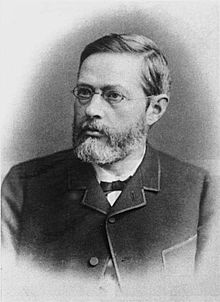Julius Tafel (entrepreneur)
Julius Tafel (born November 24, 1827 in Stuttgart ; † October 24, 1893 there ) was a German entrepreneur.
Life
Julius Tafel came from a Swabian family from Württemberg. He was the second youngest son of Marie Auguste Schmidt (1791-1836) and Johann Carl Gottfried Christian von Tafel (1795-1854), royal Wuerttemberg court domain councilor, chief treasurer at the court of the King of Wuerttemberg in Stuttgart.
Career
After attending high school in Stuttgart, Tafel studied natural sciences with a focus on chemistry at the Royal Polytechnic School in Stuttgart. After completing his studies, Julius Tafel entered the civil service in 1847 as an intern at the royal steelworks office in Königsbronn (Kr. Heidenheim / Brenz). There have been iron works there since the Middle Ages, which flourished in the second half of the 18th century. A little later he was transferred to the Royal Iron Works in Wasseralfingen. At that time, however, he recognized that working as a Württemberg civil servant would not satisfy him in the long run. He wanted freer, more responsible work. The 29-year-old was offered the position of director in one of the v. Roll'schen Eisenwerke is not unwelcome in Switzerland. This joint-stock company, founded in 1823, owned several plants, the most remote of which was the one in Choindez in the canton of Jura near the town of Delsberg / Delémont . After the war of 1870/1871, he returned to Germany with his family in 1875 and founded his own ironworks in Nuremberg in 1876, the J. Tafel & Co.
In what was once the largest German welding iron rolling mill, he first produced bar iron and welding iron from high-quality scrap . One year after the company was founded, 40 people were employed and 1,800 tons of bar iron were produced. He later expanded the business as a supplier for railway construction. Starting in 1899, around two tons of rail nails were manufactured every day. Julius Tafel retired from the plant in 1891 and his sons Hermann and Wilhelm followed him in the management. His youngest son Julius became a chemist and professor in Würzburg.
The J. Tafel & Co. plant was converted into a stock corporation in 1900: Eisenwerk Nürnberg AG . The factory was badly damaged in World War II ; it did not reach full capacity until the beginning of 1950. In 1976, after 100 years, the end of the plant came to an end. Due to the structural change, it was shut down.
literature
- Gerhard Hirschmann: The Nuremberg entrepreneur Julius Tafel and his iron rolling mill . In: Communications of the Association for the History of the City of Nuremberg, Volume 75, 1988.
- Manfred Bräunlein: 150 years of the railway in Nuremberg . P. 181, ISBN 3-922138-20-9 .
Web links
- Regional information system for Baden-Württemberg (LeoBW): Julius Tafel - Brief Biographical Information
- Tafel'scher Familienverband, website of the Tafel family
- Pictures of the table work
- The company and the Tafel family in Nuremberg by Gerhard Hirschmann (lecture from July 21, 1984 on the 5th Tafel family day in Fürth)
| personal data | |
|---|---|
| SURNAME | Tafel, Julius |
| BRIEF DESCRIPTION | German entrepreneur |
| DATE OF BIRTH | November 24, 1827 |
| PLACE OF BIRTH | Stuttgart |
| DATE OF DEATH | October 24, 1893 |
| Place of death | Stuttgart |


